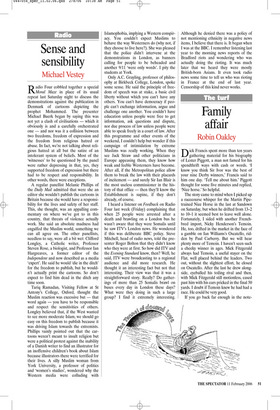Sense and sensibility
Michael Vestey
Radio Four cobbled together a special Moral Maze in place of its usual repeat last Saturday night to discuss the demonstrations against the publication in Denmark of cartoons depicting the prophet Mohammed. The presenter Michael Buerk began by saying this was not yet a clash of civilisations — which it obviously is and a carefully orchestrated one — and nor was it a collision between two freedoms, freedom of expression and the freedom from religious hatred or abuse. In fact, we’re not talking about religious hatred at all but the satire of an intolerant system of beliefs. Most of the ‘witnesses’ to be questioned by the panel were rather depressing in that, yes, they supported freedom of expression but there had to be respect and responsibility. In other words, there were exceptions.
A regular panellist Melanie Phillips of the Daily Mail admitted that were she an editor she wouldn’t publish the cartoons in Britain because she would have a responsibility for the lives and safety of her staff. This, she thought, was an appalling commentary on where we’ve got to in this country, that threats of violence actually work. She said an absolute madness had engulfed the Muslim world, something we can all agree on. The other panellists, needless to say, were all a bit wet: Clifford Longley, a Catholic writer, Professor Steven Rose, a biologist, and Professor Ian Hargreaves, a former editor of the Independent and now described as a media ‘expert’. He said he would ‘die in the ditch’ for the freedom to publish, but he wouldn’t actually print the cartoons. So don’t expect to find him dead in the ditch any time soon.
Tariq Ramadan, Visiting Fellow at St Antony’s College, Oxford, thought the Muslim reaction was excessive but — that word again — you have to be responsible and respect the sensitivities of others. Longley believed that, if the West wanted to see more moderate Islam, we should go easy on this freedom to publish because it was driving Islam towards the extremists. Phillips vainly pointed out that the cartoons weren’t meant to insult religion but were a political protest against the inability of a Danish writer to find an illustrator for an inoffensive children’s book about Islam because illustrators there were terrified for their lives. A silly Muslim woman from York University, a professor of politics and ‘women’s studies’, wondered why the Western media were colluding with Islamophobia, implying a Western conspiracy. You couldn’t expect Muslims to behave the way Westerners do (why not, if they choose to live here?). She was pleased that the police didn’t intervene at the demonstrations in London, as banners calling for people to be beheaded and another 9/11 ‘were only words’. I pity the students at York.
Only A.C. Grayling, professor of philosophy at Birkbeck College, London, spoke some sense. He said the principle of freedom of speech was at stake, a basic civil liberty without which you can’t have any others. You can’t have democracy if people can’t exchange information, argue and challenge one another. You couldn’t have education unless people were free to get information, ask questions and dispute, nor due process of law unless people were able to speak freely in a court of law. After this programme and other events of the weekend, I couldn’t help but wonder if this campaign of intimidation by extreme Muslims was really working. When they see Jack Straw and other politicians in Europe appeasing them, they know how weak and feeble Westerners have become. After all, if the Metropolitan police allow them to break the law with their placards of incitement — and surely Sir Ian Blair is the most useless commissioner in the history of that office — then they’ll know the Establishment is supine, if they don’t already, of course.
I heard a listener on Feedback on Radio Four last week (Friday) complaining that when 25 people were arrested after a death and brawling on a London bus he wasn’t aware that they were Somalis until he saw ITV’s London news. He wondered if this was deliberate BBC policy. Steve Mitchell, head of radio news, told the presenter Roger Bolton that they didn’t know who they were at first. So how did ITV and the Evening Standard know, then? Well, he said, ITV were broadcasting to a regional audience and did more research. He thought it an interesting fact but not that interesting. Their view was that it was a straightforward story. Really? Do gatherings of more than 25 Somalis brawl on buses every day in London these days? What were they doing in such a large group? I find it extremely interesting. Although he denied there was a policy of not mentioning ethnicity in negative news items, I believe that there is. It began when I was at the BBC. I remember listening last year to the morning news reports of the Bradford riots and wondering who was actually doing the rioting. It was much later that we heard they were mostly British-born Asians. It even took radio news some time to tell us who was rioting in France at the end of last year. Censorship of this kind never works.














































 Previous page
Previous page